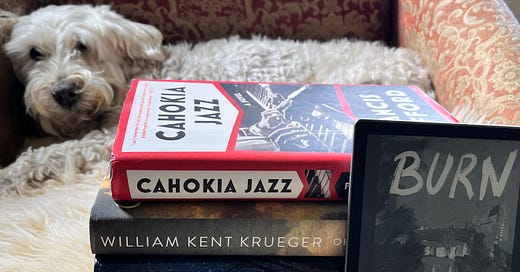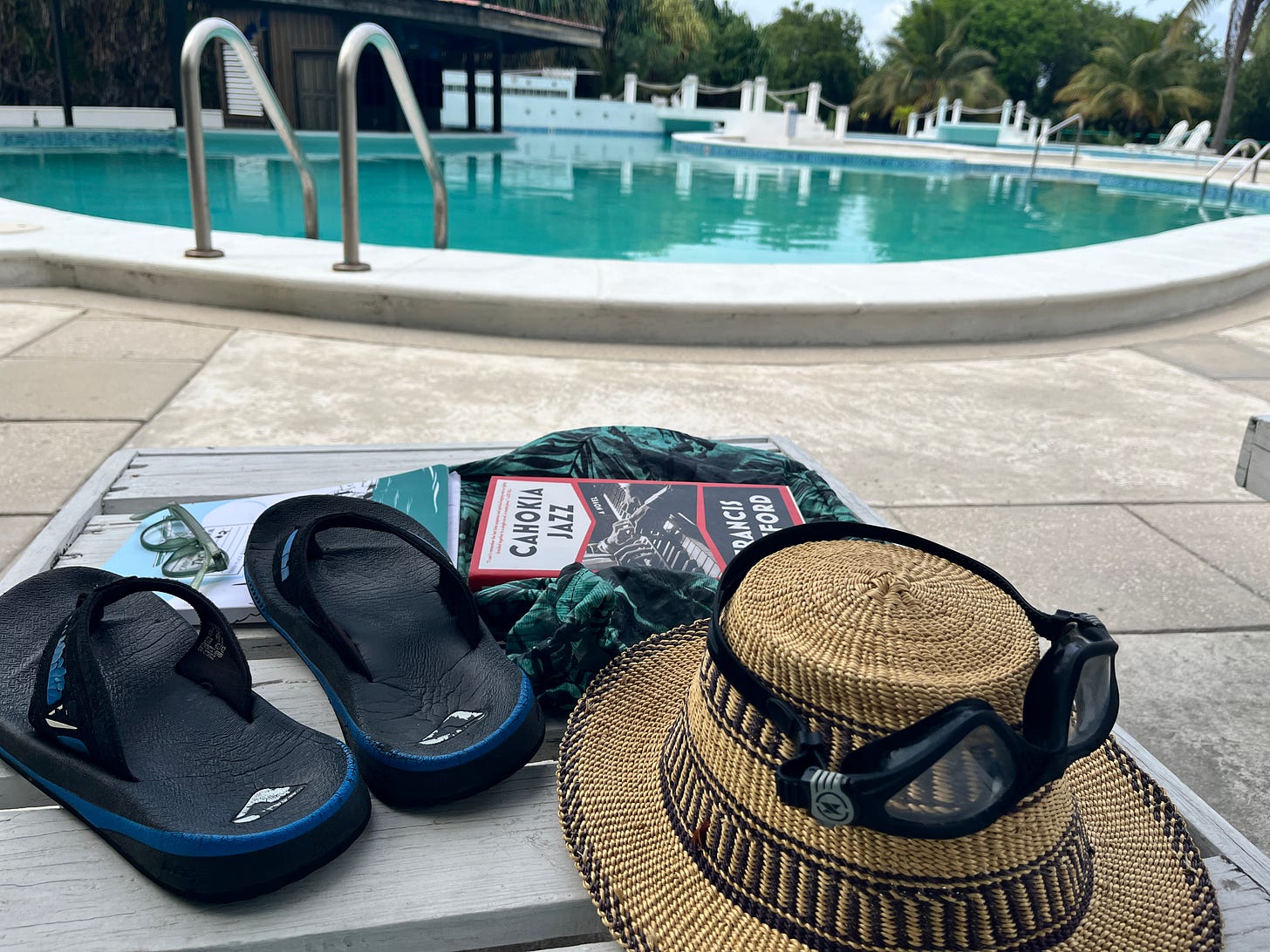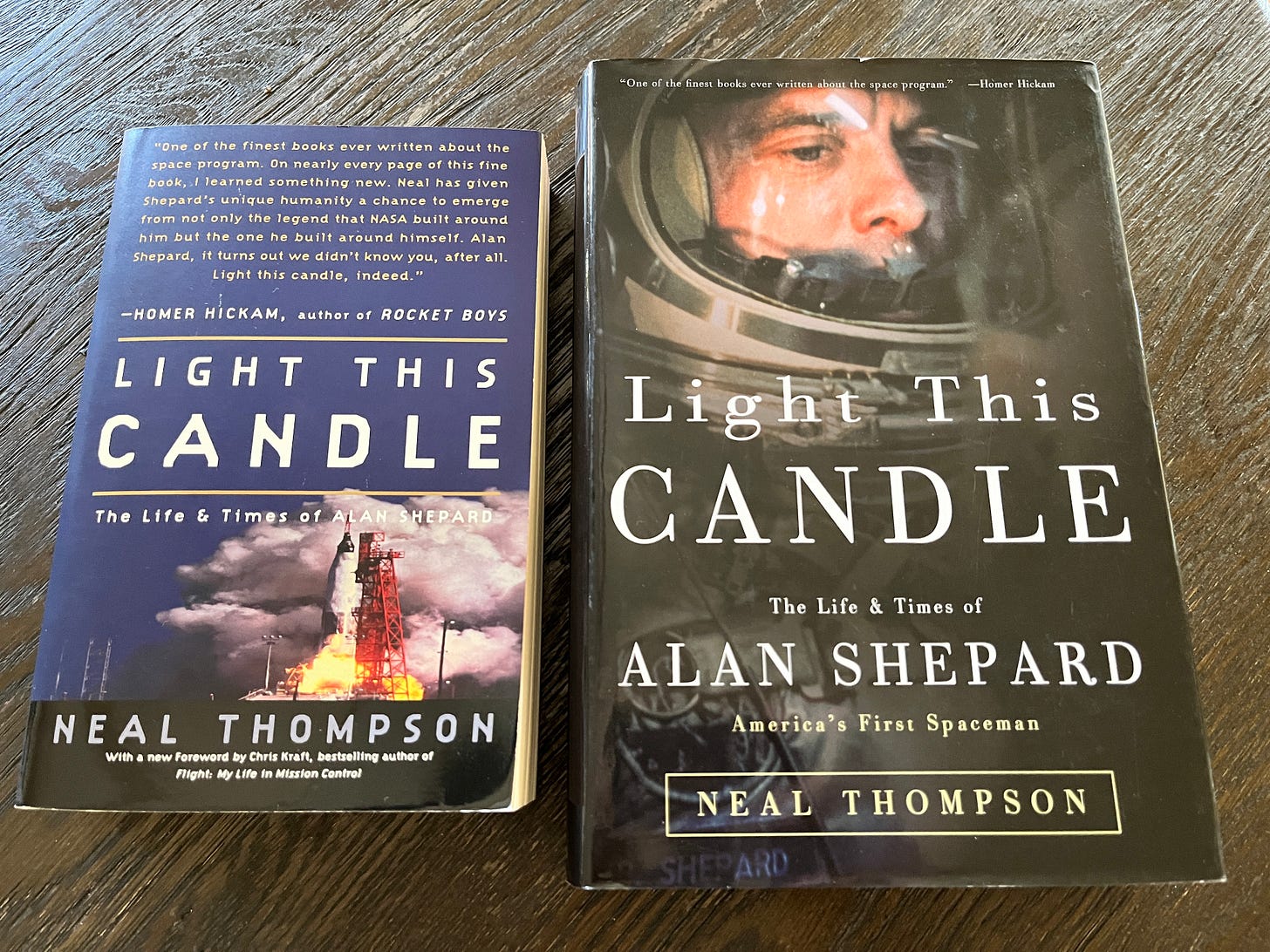Blood & Whiskey #38
New mysteries (in pretty, haunted places) from Chris Whitaker, Peter Heller, Francis Spufford, and Sarah Crouch. An older gem from William Kent Krueger. NYT's Best 100 Books and more.
Hey there friends and readers,
During a recent Covid funk, I thought about what connected this month’s books and what I look for in all good stories. A twisty mystery is fun. Believable and empathetic characters are essential. But most vitally important to me is a strong sense of place, which is this month’s throughline, with stories set in rural Maine, the Puget Sound coast, small-town Missouri, and the fictional city of Chahokia. (As I was drafting this and got smacked by Covid I also read Krueger’s Ordinary Grace in a 2-day fog — more on northwoods Minnesota next month.)
Cahokia Jazz, by Francis Spufford — I could devote an entire newsletter to the weird, ambitious inventiveness of this reimagined version of America circa 1922. Spufford has not only created an alternative nation in which Aztec-descendent natives managed to cling (loosely) to a small piece of their former land — the fictional city of Cahokia (near real-life St. Louis). He’s crafted an entirely new American world order, with reshaped borders, social and political alliances, invented languages, rites, rituals, and, well, lots of blood. At the core of the story is detective (and jazz pianist) Joe Barrow, trying to find out who gutted a Klansman named Fred Hopper and left his disemboweled body atop a downtown building. Joe has no true alliances: he looks indigenous (he was orphaned), but can’t speak the native language, Anopa. He’s a cop, but out of sync with his corrupt and racist peers, including WWI-damaged partner Phin. The one place he feels at home is on stage with fellow musicians, but the day job mostly keeps him away from his keys. Cahokia is a “mongrel city” (as an FBI jerk calls it), with white people (many of them KKK-aligned) living uneasily among takouma (native) and takata (Black) people. On each page it’s unnervingly unclear who runs the show: the taklousa (whites). But mysterious and beautiful Moon and her uncle Sun, leaders of the takouma, also hold power. So do leaders of the Navajo and Mormon republics out west, and the Russian-owned “NST” region that in Spufford’s telling is not our Alaska. A reckoning is simmering.
Spufford is a smart, slick, gritty, witty writer. At times I wasn’t sure who to root for. Many of the characters are hard to like, and the murder mystery is often just scaffolding for the beguiling world he’s carefully built. But the language is vivid, fresh, bizarre, original; the scenes chaotic, exotic, and often quite bloody. At times I was awed and even intimidated at his pyrotechnic, sci-fi-level Cahokian creation. I was also grateful for the closing four-page summary about his research and the real-life details that inspired parts of his story. (Such as: Anopa was based on a pidgin language used along the Mississippi among Chickasaw, Choctaw, and Creek people and their French and English visitors.)
Btw, turned out that a quick visit with my dad to Belize was the perfect place to get lost in this trippy, sometimes challenging, wildly ambitious story:
Burn, by Peter Heller — I love the high bar scenarios Heller sets with his intense but heartfelt in-the-wild action stories (others include The River, The Guide, The Last Ranger, which I reviewed here last year). In this story, he aims higher: two childhood friends are hunting in Maine when they come across a bombed-out village, charred to the ground, bodies scattered. They’ve lost cell service, bridges have been blown up, villages are empty, black choppers circle. In this one Heller brings his backwoods storytelling chops into a politicized present day. It’s not giving anything away to say secession is in the air, and Maine is caught in the crosshairs. The friends are trapped and far from home, trying to survive and understand the conflict that’s been unleashed during their time in the woods. Heller tells great stories, but he’s foremost a stylist and poet, and I could fill a whole newsletter with lines I highlighted in Burn. Here’s a few:
The sun broke over the trees and ignited the frost to a crystalline brilliance that for a few minutes blinded them.
The pale wood smoke drifted straight upward out of the meadow.
The frost had melted in the grass and yarrow and goldenrod, and the meadow was wet and glistening, as if after rain.
It was a brilliant fall morning in one of their favorite territories on earth, and the air stirred barely with the particular sweetness of fallen leaves and turning woods, of moss and spicy ferns and wet earth.
Below them were pastures the farmer had let go: the grasses and clover were tall and golden and flecked with Indian paintbrush and wild pea flowers and black-eyed Susans, Queen Anne’s lace, fireweed.
But often, after a moment of beauty, we hear the gunshot, see the husk of a burned-out car or boat, hear the cries of an abandoned young girl, or discover a corpse. As one of the friends observes: “It seemed like they, whoever they were, wanted no witnesses at all.” And this: “Everybody’s crazy. Berserk.” Yup.
All the Colors of the Dark, by Chris Whitaker — Patch and Saint are misfit besties in small-town, mid-70s Missouri. He wears pirate outfits and a patch over his bad eye and quotes Blackbeard; she raises bees with her grandmother, the bus driver. One day, someone tries to kidnap beautiful classmate Misty, Patch comes to her rescue, and the baddie kidnaps Patch instead. From that setup unfolds a sprawling epic about small town secrets, class, art, friendship, love, and obsession. It’s not a spoiler to share that Patch returns home a changed person. Saint joins in his fixation on finding those who snatched him — and kidnapped others who didn’t escape. There are some great characters here, including a boozy art dealer and beleaguered Chief Nix, who tries to protect Patch and Saint from themselves. At one point Saint asks, “Will Patch be the same?” The Chief touches her cheek: “None of us will, kid.” The story takes its time, covering two-plus decades over 600 pages, at times a bit too slowly for me. But if you’re headed on vacation, it’s a great summer read to get lost in.
Middletide, by Sara Crouch — I enjoyed this debut mystery set in a fictional town on Washington’s Olympic Peninsula, roughly across Puget Sound from my Seattle neighborhood. Crouch, a former professional marathon runner, has a nice easy-going style and (like Heller) is especially good at finding moments of natural beauty amid the procedural machinations of an investigation: nettle-covered forest paths; layers of moss and pine needles muffling footsteps; a plunge into a chilly pool of water; snowcapped mountains in the distance.
The gist of it: one morning at the edge of an inlet, two fishermen find Dr. Erin Landry hanging from a rope. The property belongs to Elijah Leith, who had recently returned to Point Orchards after his father’s death, years after leaving home to become a writer in California. Someone sends Elijah’s mostly forgotten novel to the sheriff. It’s a mystery about a murder made to look like a suicide — eerily similar to Dr. Landry’s death. The cops don’t believe it: “Too convenient,” says the sheriff. But all evidence points to Elijah, who insists on his innocence, then runs away before the sheriff can question him. He’s hoping Nakita, the Native women who’d been his long-ago girlfriend, might save him. Without giving anything away, though, some sections started to bug me… Characters and voices felt off and I thought the book was going off the rails. I scribbled in the margins “no way” and “Ugh!” Soon enough, I realized that was the point. I’d been duped by a clever plot twist. I also circled a few cliches I’d have edited out (world of hurt, heap of trouble), but mostly liked the world and learned that Crouch is working on a new book now set near Mount St. Helens. I’m all in.
More books and coming soon…
I did a Q&A with Kimberley McCreight that I’ll share next week. Her new book, Like Mother, Like Daughter (reviewed in April) is out Tuesday.
Looking forward to new ones from Willy Vlautin (The Horse); Eli Cranor (Broiler); Kevin Barry (The Heart in Winter); and a debut psychological thriller from fellow Seattle nonfiction writer Elizabeth Eaves (The Outlier).
I’ve been sifting through the New York Times’ curious and eclectic Best 100 Books of the 21st Century list, and finding some forgotten gems plus some I’d never heard of. Despite some to-be-expected odd inclusions and omissions I was happy to see three favorite nonfiction books on the list: Katherine Boo’s Behind the Beautiful Forevers; John Jeremiah Sullivan’s essay collection, Pulphead; and Patrick Radden Keefe’s Say Nothing.
Mocktail of the Month
Here’s a weird bit of oversharing: after a hike near Mount Rainier, my foot swelled like a blowfish and the diagnosis was, ridiculously, gout. It hurt like a mother and left me hobbling until the steroids kicked in. I’ve had chronic arthritis for many years and have now learned that it leaves me vulnerable to weird shit like kidney stones (not yet, thankfully) and gout (arthritis’s creepy cousin). Turns out two things can contribute to flareups: whiskey and beer.
In recognition of that bit of glum news, here’s a mocktail…
NA Margarita
(adapted from last month’s cocktail, the La Cigua*)
3 oz. fresh lime juice
2 oz. fresh orange juice
2 oz. agave syrup
1 oz. cucumber juice (or chopped cuke if blending)
seltzer
Two options: a) add all ingredients to a shaker with ice, shake and strain into an ice-filled, salt-rimmed glass, then top with seltzer; b) toss everything in a blender, blend, pour into ice-filled, salt-rimmed glass.
* If you’re not mocktail-minded, just add a big splash of gin or tequila. Boom.
Finally, a quick Blood & Whiskey update… This newsletter started more than three years ago as a Covid (ha!) project and I’ve had a blast sharing book reviews, author interviews, cocktails, mocktails, and playlists with you. But a couple writing projects need my attention, so in the months ahead I’ll be scaling back on Blood & Whiskey (and on the whiskey, too). I’ve got a few more newsletters and author interviews planned for the coming weeks, but at some point may go on hiatus, with hopes of reviving this at a future date. You’ll probably still hear from me sporadically, just not monthly, and I may pause all paid subscriptions. But I’m very grateful to those who’ve throw some $ at this thing.
Thanks everyone for reading along with me. Please drop a line if you have a book or drink recommendation, a newsletter suggestion or a quick hello.
cheers,
-Neal
Find me @ Instagram; sometimes Facebook, Twitter, LinkedIn, Goodreads








